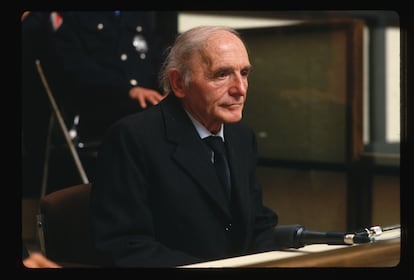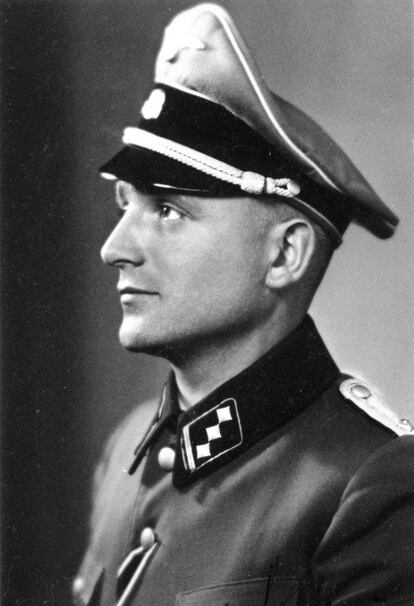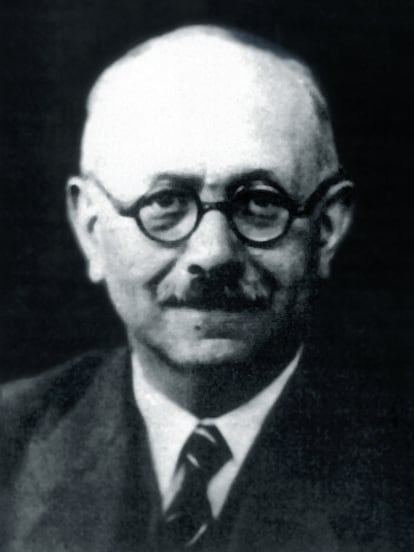The French historian Marc Bloch (1886-1944) will enter the Pantheon of illustrious figures of France, as announced by the President of France, Emmanuel Macron, on November 23. It has now been 80 years since Chauvraisone of his names under the German occupation, was arrested, interrogated by the head of the Gestapo, Klaus Barbie, and finally executed along with a group of 30 people. He had just finished the draft of two fundamental works to understand our time: The strange defeat, about the collapse of France before Nazism, and Introduction to historya defense of the historian’s work against obscurantism and hatred, words that the medievalist himself left written in blood.
His is a life linked to his profession and the history of Europe. He was born in Alsace, into a Jewish family, although he soon moved to Paris, where his father taught Ancient History. Bloch follows the path laid out for the French intellectual and political elite and enters the Ecole Normale Supérieure, but opts for teaching, his great passion; He worked in the high schools of Montpellier and Amiens, until the Great War broke out. Captain Bloch returns decorated to his native region, where he enters the University of Strasbourg, reincorporated into France. There he comes into contact with a group of social scientists, many of them German, who want to leave behind their old disciplines, participants in the pre-war context. For years they have promoted the exchange of methods and ideas between economics, geography, sociology and psychology. At that time he met his great friend, Lucien Febvre, with whom he founded, in 1929, the magazine Annals. Under the subtitle of ‘Economic and social history’, which completely renews the discipline.
In a decade he published his great work, feudal society, and accesses the Chair of Economic History at the Sorbonne. But he barely has time to enjoy himself because in September the war breaks out again. Captain Bloch, despite being over 50 years old and having six children, volunteers. At the front, he witnesses a continuous retreat, from Belgium to Dunkirk, which leaves the army and the country paralyzed. He describes with enormous lucidity the reasons for an unmitigated defeat that no one wants to acknowledge. The French military strategy, relying on the old defensive idea of the trenches, is a big mistake.
“The triumph of the Germans was, fundamentally, an intellectual victory,” writes Bloch, who finds the same attitude of the high command in politics, diplomacy and in much of French society. Pétain, the hero of Verdun, asks for an armistice with Germany, in the midst of an atmosphere of internal war. Collaborationism and racial laws begin in France. Following the statute of the Jews drawn up by the Vichy regime, in October 1940, Bloch was expelled from the University. He barely manages to move with his family to the center of a France divided in two.
Already in Clermont-Ferrand, he established contact with the first local resistance groups, but it was in Montpellier where he became part of Combat, one of the largest clandestine networks in the entire country. Albert Camus, editor-in-chief of its organ of expression, agrees with Bloch in opposing the occupation with all means and in denouncing the shame of collaboration. Both carry the need to write and be clear to the end.
In mid-1943, Bloch moved to Lyon to organize the insurrection of the entire area. It uses the nickname Narbonne, the old capital of Gaul. Himmler himself, one of the Nazi leaders, orders to end the problems and accelerate the “final solution” in France. The SS destroy the port and old city of Marseille, seal the border with Spain and tighten the siege on Lyon, Nice and Nimes. On March 8, 1944, Bloch was arrested by the Gestapo. Transferred to prison, he begins to be tortured by Klaus Barbie, known as The Butcher of Lyon.

Bloch, who just two decades earlier had written The thaumaturge kingsknows that men like Barbie have a blind faith in power. They exert it on their victims through beatings and humiliation. The old supernatural belief in the royal dynasties of France and England persists in the 20th century through the cult of the leader. A new feudalism sweeps Europe. Bloch confronts him, with everything he knows militarily, with everything he can do as a historian.
While working underground he wrote his last work, which he leaves unfinished. It is not a complaint or an accusation against the collaborators. He knows that, sooner or later, they are going to expose him. It is a Apology of historya joint defense of archival work and critical capacity, the two great weapons of “the science of change,” as he conceives history.

Barbie, who just a few months before killed Jean Moulin, the head of the French resistance, has a free hand. It starts with the cold showers at dawn and the isolation cell; He still has dislocated wrists and several broken ribs, but Bloch only reveals his real name. Finally, on June 16, with the allies in Normandy, he is taken to the outskirts of Lyon, where he is executed along with other members of the local resistance.
Marc Bloch enters the Pantheon for “his work, his teaching and his courage,” said Macron. His books of explanatory synthesis continue to be used today as manuals. His didactic idea of history as a tool of citizenship, on the other hand, is seen as a danger to the story of pure identities and founding myths, which seek to resurrect the magical formulas of the past. Therefore, it is very important that today, in the face of the push of a new feudalism, Bloch achieves the greatest public and official recognition. Enter the Pantheon in your own right.

